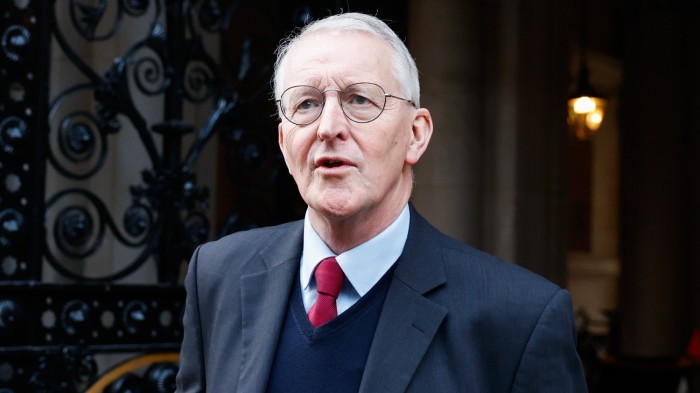The UK government has rejected the first attempt by Northern Ireland’s unionist parties to block the application of updated EU legislation in the region, saying the key test was not met.
But Hilary Benn, Northern Ireland secretary, held out the prospect that Britain could seek to avoid trade barriers emerging in future by aligning its laws with EU rules in force in Northern Ireland.
Unionists sought to trigger the so-called “Stormont brake” just before Christmas in a bid to halt the application of updated EU legislation on the labelling on chemicals in the region.
Benn said on Monday that he recognised the “sincere and genuine concerns” raised but concluded that the key test — whether the amended laws would have significant and lasting impact on everyday life — had not been met.
The brake was introduced in 2023 under the Windsor framework governing post-Brexit trading arrangements. It allowed objections to be raised in the “most exceptional circumstances and as a last resort”.
In order to avoid a hard border on the island of Ireland after the UK left the EU in 2020, Northern Ireland retained access to the EU’s single market for goods. But that meant still accepting some EU law, upsetting hardline unionists who say that undermines their sovereignty as part of the UK.
In his decision, which comes as the UK seeks to reset relations with Brussels, Benn said there was “no room for complacency in terms of potential impacts”.
The UK was committed to taking steps to avoid the emergence of barriers to trade in chemicals between Britain and Northern Ireland and to ensure the smooth operation of the UK internal market — including, if necessary, aligning British and Northern Irish regulatory regimes for the sector, Benn said in a letter to Edwin Poots, speaker of the Northern Ireland Assembly.
“The government will explicitly consult on applying a consistent regime across the United Kingdom, should this be required to safeguard the UK internal market,” Benn said. “The government intends to launch this consultation as soon as possible.”
That prospect is not a blanket plan to ensure British and EU laws align across the board; the UK would take a case-by-case view regarding any future objections in other sectors.
Gavin Robinson, whose Democratic Unionist party is the largest pro-UK party, had argued that the chemicals legislation would fracture the UK internal market, push up costs for manufacturers and create a “chill factor” for British companies supplying Northern Ireland.
Matthew O’Toole, of the smaller Social Democratic and Labour party and the opposition leader in the assembly, said that instead of “continual debate” about the Stormont brake, “we need the secretary of state and the UK government to engage with the EU around a permanent solution that recognises Northern Ireland’s unique position and allows us to make the most of dual market access”.
The DUP boycotted Stormont for two years over Brexit trade rules, paralysing local politics, and the assembly and power-sharing executive were only restored in February last year.
Analysts said they did not expect unionists to cause similar disruption after the Stormont brake setback.
Source link









